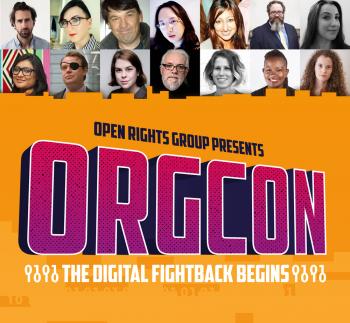 Women made up more than half of the speakers at November’s high-profile ORGCon digital freedom conference, which in the world of ‘tech’ is refreshing. The conference organiser, Open Rights Group (ORG), should be praised for achieving such a balance. ORG is the UK’s only grassroots organisation working to protect our right to privacy and free speech online.
Women made up more than half of the speakers at November’s high-profile ORGCon digital freedom conference, which in the world of ‘tech’ is refreshing. The conference organiser, Open Rights Group (ORG), should be praised for achieving such a balance. ORG is the UK’s only grassroots organisation working to protect our right to privacy and free speech online.
ORGCon drew a mix of activists, academics and digital professionals to Friends Meeting House, London to hear some of the world’s foremost speakers on digital freedom talk about new dangers from digital technologies – and what we can do to push back.
Many talks focused on how marginalised communities can be either empowered or further silenced, depending on how cyberspace is managed. The audience was perhaps two-thirds male.
Last year, the UK government passed the Investigatory Powers Act, the most extreme surveillance law found in any democracy. Even those who choose to remain, as far as possible, off-line are impacted by their connected neighbours, so ORG’s work is increasingly important.
While Saturday’s programme followed an auditorium format, Sunday offered more intimate sessions, with more space for planning campaigns.
Your grandparents’ rights
Perhaps the most thought-provoking presentation argued that we should demand the same civil liberties for our children as existed for our parents.
If you read a newspaper online, you are being tracked. The publisher knows which articles you read, how long you spent reading them and even which articles you thought about reading but skipped over.
Similarly airports and shopping centres track individual footfall, by following the smart phone in your pocket, as it connects to WiFi hotspots. You can now be required to reveal your encryption password to allow officers to rifle through the calendar and contacts in your smartphone. Rick Falkvinge argued that we must demand the same privacy online that we have long expected off-line.
The session on killer robots considered how CCTV quickly became ubiquitous in Britain, after the killing of James Bulger in 1990. Professor Noel Sharkey asked what future emergency might lead the public to acquiesce in the widespread use of armed drones.
The first day of ORGCon concluded with a discussion of how digital regulation may evolve as the UK leaves the EU. As campaigners, we must work to ensure that this moment of change is used to bring higher standards, not to undermine hard-won freedoms.
The weekend left the audience with a strong sense of work to be done and of opportunities for action.


